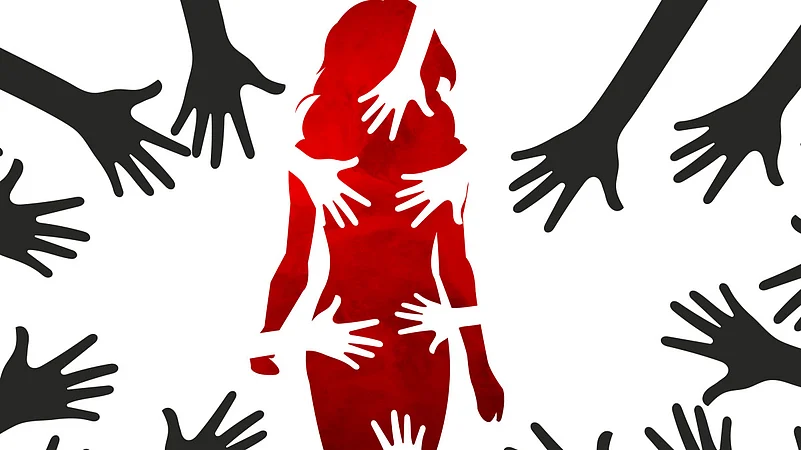Aarti (not her real name) can’t remember when she lost her mother. She can’t forget she was raped at 10 for the first time. Subsequently, she was allegedly abandoned by her father and stepmother in Ghazipur. She spent a few years in an orphanage before shifting to the Rescue Foundation in Kanjhawala, Delhi, where she learned some life skills that would help her bear the burden of adulthood. As soon as she completed her 18th birthday, she left the institution in 2018. But her transition into the real world terribly veered off the anticipated course and ever since, she seems to have fallen into a trap of unending nightmares.
Aarti got married and gave birth to a baby at 18. Three months after she became a mother, she was separated from the baby and thrown out of the matrimonial home at Darbhanga in Bihar. She begged outside a temple in Samastipur and did several menial jobs for survival. Reportedly, she landed in the After Care Home Gaighat, Patna, in April 2021, where she was allegedly drugged and sexually exploited for months. Though her alleged suicide attempts failed, she remained successful in fleeing the shelter home recently.
And now, aged 22, when she has told her ordeal, alleging that other women too have been enduring physical abuse at the shelter home, she is being slut-shamed.
On Wednesday, January 2, Patna High Court took suo-moto cognizance of her allegations, directing the Additional Chief Secretary of the state’s social welfare department to file an action taken report. The matter has been listed for hearing on February 7, 2022.
The court intervened after the Juvenile Justice Monitoring Committee (JJMC) contradicted to the clean chit given to the shelter house management by the social welfare department.
The court order quoted the findings of an inspection conducted by the JJMC that referred to the Muzaffarpur shelter home case, describing the news report regarding the After Care Home Gaighat, Patna, as “yet again societal/collective failure and shame”.
In the Muzaffarpur case, the Bihar government submitted the action-taken-report to the National Human Rights Commission last week, saying it had paid financial compensation between Rs 3 lakh and Rs 9 lakh to 49 victims. The issue was first highlighted in an audit report submitted by the Tata Institute of Social Sciences to the state’s social welfare department in April 2018. But the FIR was lodged on May 31 following a public outcry.
Aarti’s trauma
Soon after Aarti left the institution, she started working at a jewellery workshop in Delhi, she told Outlook. At a time when she was struggling to become self-dependent, she got fatally injured in a road accident at Badarpur Border near Faridabad. She was hospitalised for two months. It was during this period, she narrated, she accepted the marriage proposal of her would-be husband, Vivek Paswan, as he looked after her in the hospital.
After her wedding, Aarti said, her husband took her home in Darbhanga in Bihar but only to be expelled a few months later. She was taken back home for three months after her husband was summoned to a local hospital where she delivered a baby boy.
During her stay at the After Care Home Gaighat last year, she was allegedly drugged and sexually exploited regularly. She even attempted suicide on several occasions but remained unsuccessful. “Other destitute girls need to be rescued from that hell. They have no option but to die,” she said, showing scars on her wrists, claiming she attempted suicide by cutting her veins with a razor.
The shelter in question—which has a capacity of 140 inmates, typically victims of human trafficking and children in conflict with the law — is home to over 260 inmates including 30 mentally challenged women.
“I even approached the police but was denied help,” she alleged, questioning the veracity of popular campaign, “Beti Bachao, Beti Padhao—Save Daughter, Educate Daughter.”
Authorities in denial
The police dismissed her complaints, labelling her a “Badchalan Ladki — a slut,” according to women activists who have been supporting her. Veena Manvi, advocate Meenu Kumari, Fahima Khatoon and Arunima Kumari, who work with the Mahila Vikas Manch, accused the local police and administration of victim-blaming. “When we approached the police and administration, along with the victim, the officials started shaming her on the basis of their purported telephonic conversation with her husband. They didn’t bother to listen to the victim or initiate required action as per laws.”
Arunima Kumari told Outlook, “We have no reasons to doubt her allegations as we have received similar complaints from this shelter in the past as well. Instead of rebuking her, the allegations need to be probed thoroughly.”
The court order also mentions the juvenile committee’s displeasure over police inaction and the director of social welfare’s conclusion that the allegations were baseless. “The Director Social Welfare Department has concluded on the basis of the CCTV footage installed in the After Care Home that the accusation made by the ‘so-called victim’ is baseless and false,” the order read, adding that during the inspection it was found that the CCTVs are lying defunct.
Nivedita Jha, a Patna-based writer and president Bihar chapter of South Asian Women in Media, criticised the authorities. “The local administration and the police are in denial as it happened initially when the Muzaffarpur shelter home case came to the light. So there should be a thorough investigation,” she told Outlook.
Earlier in September 2018, Jha had moved Supreme Court challenging the Patna High Court order banning media from reporting on the Muzaffarpur case that involved an epidemic of sexual violence against homeless girls at 15 shelters, which house victims of domestic violence and sex trafficking.
Several women organisations including Akhil Bhartiya Pragatisheel Mahila Association, Bihar Mahila Samaj, Akhil Bharatiya Janwadi Mahila Samiti, Loktantrik Jan Pahal, Nari Gunjan, Gharelu Kaamgaar Union and Make a New Life Foundation have urged the Bihar government to ensure Aarti’s security.
Findings of the committee
In its report, the JJMC has stressed the need for adequate and trained staff at the shelter home. Currently, the report said, the home is being run by a Child Protection Officer, Vandana Gupta, working as a superintendent on a deputation basis.
During the inspection, according to the report, the kitchen was not found to have been run properly and the teachers engaged to educate inmates were found to be working as accountants.
“One of the inmates was found sleeping on the staircase who apparently told the visiting team that no bed was given to her since the time she had landed up in the aforesaid After Care Home,” it stated, underlining the complaints about the corporal punishment. The JJMC report added that the inspection report was never forwarded to the Juvenile Justice Monitoring Committee’s Secretariat.
It also directed the Additional Registrar Juvenile Justice Committee’s Secretariat to inform the Principal Magistrate, Juvenile Justice Board, Patna and District Judge, Patna that any such report is straightway sent to the JJMC’s Secretariat in future.


























